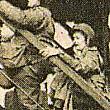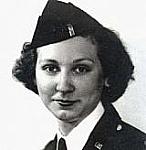
Joy Lillie: Nurse Goes to War
by Cindy Laug
published: March 9th, 2012
Twenty-two year old Joy Lillie began her service as a member of the U.S. Army Nurse Corp during WWII on April 1, 1943. She could not have imagined that she would be climbing the bluffs of Normandy searching for wounded soldiers six days after the landing at Omaha Beach, June 6, 1944. Lillie and 17 other women in her platoon were on the front lines of every major campaign in Europe: Normandy, Northern France, Battle of the Bulge, Rhineland, and Central Europe. Her medical team advanced as the battle moved forward. They were never farther than three miles from the front line. Joy recalled the time they got too close to the front and the whole platoon spent twelve hours in a ditch waiting for the fighting to stop. The 51st Field Hospital’s tents and cots could be relocated to treat the wounded. “We got used to the sound of the airplanes, the bomb, the fighting” she says. “I was brave in those days. The idea was to get as close to the front lines as possible, do the repair work, and send them to the evacuation hospitals as soon as possible.” (Find more information to your right in Related Items)
Joy Mergener, born in 1920 in the small farming community of Coopersville, took her nurse's training from 1939 to 1942 at Mercy Central School of Nursing in Grand Rapids. When Russ Lillie, her high school sweetheart, came home on leave in February 1943, they were married. Russ was serving stateside in the Rainbow Division of the Army. In April 1943, Joy, against her husband's objections, enlisted in the U.S. Army Nurses Corp.
Oran, North Africa aboard the USAHS "Shamrock" was Joy's first assignment. The injured from Italy and Sicily were transported to the general hospital in Oran. The original assignment, for the 15 corpsmen and 2 nurses, was to return with the casualties to the states, but the team did nothing from September to January. They finally were disbanded and sent back stateside where Joy worked in the hospitals with the returning servicemen.
The 51st unit, a temporary field hospital, consisted of 3 platoons. Each platoon included 3 doctors, 5 nurses, medics, corpsmen, and a kitchen crew. They were to stay as close to the front lines as possible. The platoons would 'leap frog' over each other, pushing forward, as our soldiers broke through the enemy lines. The portable hospitals were set up in fields. The 1st platoon handled the belly, chest, and amputation cases. They administered transfusions and prepared the wounded for transport to the evacuation hospitals. "It was our job to give our boys the best medical care we could provide," stated Lt. Lillie.
Russ and Joy shared a two-week leave back home in Coopersville in January 1944. When Russ, serving in the Rainbow division, went back to serving stateside, Joy was shipped overseas to the U.K. They did not see each other again until January 1945, when Captain Tennant, Russ' superior officer, arranged for a second honeymoon. Joy took several dangerous rides to get to Russ so they could be reunited in Alsace.
Joy spoke of the time she traveled in several jeeps and a P38 reconnaissance plane to get to her husband, only to discover his troop had been sent out on a special mission at the last minute. And once they passed enroute to meet each ot' waiting for Lt. Lillie to bring him 'medical aid'. Joy worried about her husband and always looked over the wounded as they arrived, lest he happened to be among them.
Joy served overseas for two years, eight months stateside, and earned the rank of first lieutenant. The bronze star was given to her for working 72 hours straight during the Normandy invasion. In 2002, Pete Hoekstra delivered the remaining medals commemorating her service to her country. She was awarded the following medals: Bronze Star, American Campaign, European-African-Middle Eastern Campaign, WWII Victory, Normandy Medal, and Honorable Service Lapel Button WWII.
Joy didn't talk about the war when she got home. Her brother, serving in the Pacific, was missing in action for a couple of months, but he was found and returned safely home. She and Russ were re-united in January 1946, and they had each other to help work out some of the scars left from the hardship of battle. They established a home on a small farm in the city limits, and raised a family of ten, and Joy stayed home caring for the family for seventeen years. Then, she took a refresher course in nursing and went back to caregiving for 20 more years.
As Joy reflected over her decision to enlist she commented, "It was something I wanted to do, I just wanted to do something helpful. I don't know if I've said it in so many words," she said at the end of a long afternoon of interviewing, "but I am proud; I am quite proud of what I did during the war." Joy Louisa (Mergener) Lillie passed away in the fall of 2011 at the age of 91.
General Hoerner Letter
Bibliography
Books Available at the Grand Rapids Public Library
- Fessler, Diane Burke. No Time for Fear: Voices of American Military Nurses in WWII. Michigan State Univ. Press. 1996.
- Monahan, Evelyn. And if I Perish: Frontline U.S. Army Nurses in WWII. Alfred A. Knopf, 2003.
- Norman, Elizabeth M. We Band of Angels: The Untold Story of American Nurses Trapped on Bataan. Random House, 1999.
Books Available in the History & Special Collections Dept. of the GR Public Library
- Matthews, Alice. Lest We Forget: Memoirs of an Army Nurse, WWII, 1941-1946. c. 1993. Collection #310: Grand Rapids in World War II 1941-1946.


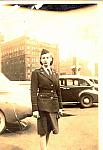

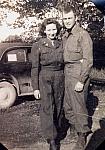
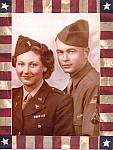
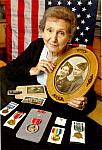
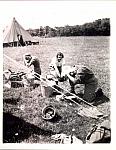
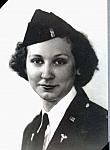
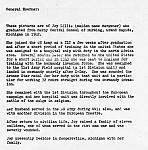
 facebook
facebook